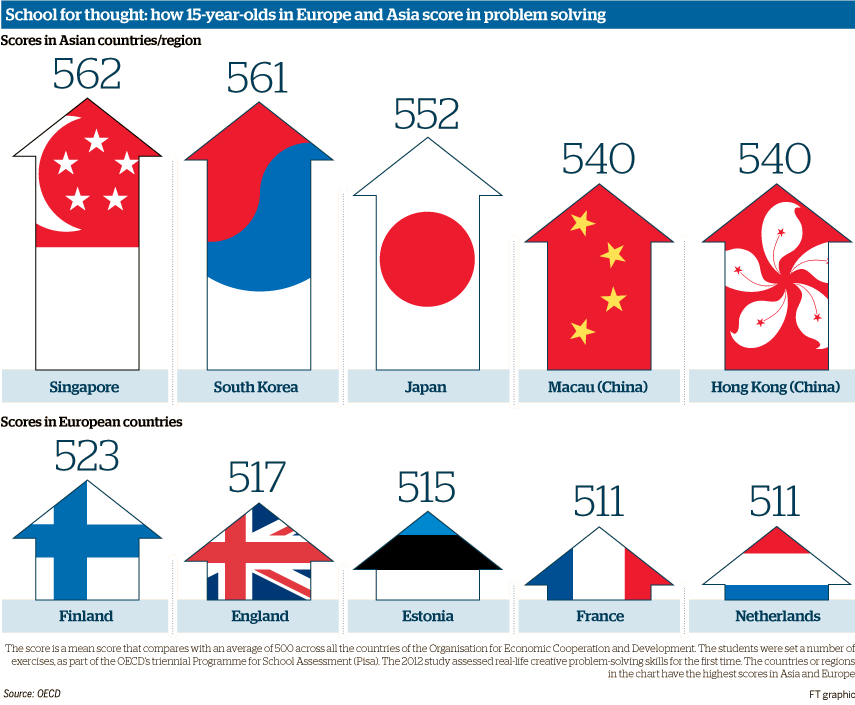This is an interesting piece from the Financial Times relating to education. It highlights the importance of having Critical Thinking approaches in the education syllabus. Note the levels achieved by Malaysia's Asian Tiger neighbours.
This is a goal that Malaysian education needs to meet. The time is now.
Here is a snippet. The full article by Jeevan Vasagar can be found here.
Schools in Europe are frequently criticised by business leaders as “exam factories” that churn out students unable to cope with life beyond the classroom. But the lesson to be drawn from international comparison is that Europe’s schools are far better at teaching creative thought than this criticism implies.
Students from the main western European countries – England, France, Germany, Italy, the Netherlands and Belgium – all performed above the average, as did pupils from the Czech Republic and Estonia. In the rest of the rich world, the US, Canada and Australia also performed above average. But the laurels were taken by east Asian territories; Singapore and South Korea performed best, followed by Japan, and the Chinese regions of Macau and Hong Kong.
That result poses a challenge to schools in the west. Critics of east Asian education systems attribute their success at maths and science to rote learning.
But the OECD’s assessment suggests that schools in east Asia are developing thinking skills as well as providing a solid grounding in core subjects.
Across the world, the OECD study found a strong and positive correlation between performance in problem solving and performance in maths, reading and science.
In general, the high-performing students were also the ones best able to cope with unfamiliar situations.
But there were interesting exceptions to the rule. When Japanese students were compared with children in other countries of similar performance in maths, science and reading, the Japanese teenagers showed better problem-solving abilities.
This, the OECD suggested, might be explained by Japan’s focus on developing problem- solving skills through cross-curricular, student-led projects.
While there is agreement about the goal, there is a divide over how best to teach children the skill of critical thinking.
Daisy Christodoulou, an educationalist and the author of Seven Myths about Education, argues that such skills are domain specific – they cannot be transferred to an area where our knowledge is limited.
“Trying to teach abstract strategies that can apply across domains, there isn’t much evidence for that,” she says.
“The farther away from the original domain you are, the weaker the transfer is. In our lives this does ring true. We all know people who are good at thinking critically about a historical problem, and not very good at thinking critically about a mathematical problem.”
Read the full piece here.

2 comments:
The Pagoh MP will deem to disagree the time is now to develop critical thinking.
He will retort it is a 'natural reaction' for racial survival to allow for more uncritical thinking even if that leads to more destructive antisocial racial paranoia.
What he has not done must somehow be right because too many of those who already know how the rest of the world has actually progressed still choose to remain quiet as mice, innocent as children, obsequious as back-bending hand-kissing slavish serfs. No?
On the other hand, they could also choose to stand up and be counted for once in the remaining years of their lacklustre lives so that their children and the children of others can stand taller because their minds would have been awakened and emboldened by new abilities shaped by a better education system that will help them become primus inter pares (instead of primus inter pariahs).
Those who know will tell you creativity and innovation are best built by sharing and interaction between peoples from diverse backgrounds and disciplines so that the mindsharing experience is enriched by new crowdsharing diversities and perspectives unachievable alone.
What has however been done here is to create our own small pea-brained eddy pool circumscribed by the artificially-drawn lines of country borders. Step out of the darkness of those lines and we will be - incinerated by reality.
Start writing those epithets for the next ten generations.
Unless you (no, not you) decide the time is now to stand up.
(All parts, together now).
http://is.gd/V96u1Y
Post a Comment